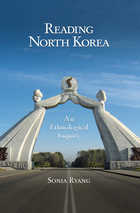

The notion of the individual was initially translated into Korean near the end of the nineteenth century and took root during the early years of Japanese colonial influence. Yoon Sun Yang argues that the first literary iterations of the Korean individual were prototypically female figures appearing in the early colonial domestic novel—a genre developed by reform-minded male writers—as schoolgirls, housewives, female ghosts, femmes fatales, and female same-sex partners. Such female figures have long been viewed as lacking in modernity because, unlike numerous male characters in Korean literature after the late 1910s, they did not assert their own modernity, or that of the nation, by exploring their interiority. Yang, however, shows that no reading of Korean modernity can ignore these figures, because the early colonial domestic novel cast them as individuals in terms of their usefulness or relevance to the nation, whether model citizens or iconoclasts.
By including these earlier narratives within modern Korean literary history and positing that they too were engaged in the translation of individuality into Korean, Yang’s study not only disrupts the canonical account of a non-gendered, linear progress toward modern Korean selfhood but also expands our understanding of the role played by translation in Korea’s construction of modern gender roles.

Socialist doctrines had an important influence on Korean writers and intellectuals of the early twentieth century. From the 1910s through the 1940s, a veritable wave of anarchist, Marxist, nationalist, and feminist leftist groups swept the cultural scene with differing agendas as well as shared demands for equality and social justice. In The Proletarian Wave, Sunyoung Park reconstructs the complex mosaic of colonial leftist culture by focusing on literature as its most fertile and enduring expression. The book combines a general overview of the literary left with the intellectual portraits of four writers whose works exemplify the stylistic range and colonial inflection of socialist culture in a rapidly modernizing Korea. Bridging Marxist theory and postcolonial studies, Park confronts Western preconceptions about third-world socialist cultures while interrogating modern cultural history from a post–Cold War global perspective.
The Proletarian Wave provides the first historical account in English of the complex interrelations of literature and socialist ideology in colonial Korea. It details the origins, development, and influence of a movement that has shaped twentieth-century Korean politics and aesthetics alike through an analysis that simultaneously engages some of the most debated and pressing issues of literary historiography, Marxist criticism, and postcolonial cultural studies.

Often depicted as one of the world’s most strictly isolationist and relentlessly authoritarian regimes, North Korea has remained terra incognita to foreign researchers as a site for anthropological fieldwork. Given the difficulty of gaining access to the country and its people, is it possible to examine the cultural logic and social dynamics of the Democratic People’s Republic of Korea?
In this innovative book, Sonia Ryang casts new light onto the study of North Korean culture and society by reading literary texts as sources of ethnographic data. Analyzing and interpreting the rituals and language embodied in a range of literary works published in the 1970s and 1980s, Ryang focuses critical attention on three central themes—love, war, and self—that reflect the nearly complete overlap of the personal, social, and political realms in North Korean society. The ideology embedded in these propagandistic works laid the cultural foundation for the nation as a “perpetual ritual state,” where social structures and personal relations are suspended in tribute to Kim Il Sung, the political and spiritual leader who died in 1994 but lives eternally in the hearts of his people and still weaves the social fabric of present-day North Korea.

The contentious relationship between modernism and realism has powerfully influenced literary history throughout the twentieth century and into the present. In 1930s Korea, at a formative moment in these debates, a “crisis of representation” stemming from the loss of faith in language as a vehicle of meaningful reference to the world became a central concern of literary modernists as they operated under Japanese colonial rule.
Christopher P. Hanscom examines the critical and literary production of three prose authors central to 1930s literary circles—Pak T’aewon, Kim Yujong, and Yi T’aejun—whose works confront this crisis by critiquing the concept of transparent or “empiricist” language that formed the basis for both a nationalist literary movement and the legitimizing discourse of assimilatory colonization. Bridging literary and colonial studies, this re-reading of modernist fiction within the imperial context illuminates links between literary practice and colonial discourse and questions anew the relationship between aesthetics and politics.
The Real Modern challenges Eurocentric and nativist perspectives on the derivative particularity of non-Western literatures, opens global modernist studies to the similarities and differences of the colonial Korean case, and argues for decolonization of the ways in which non-Western literatures are read in both local and global contexts.

READERS
Browse our collection.
PUBLISHERS
See BiblioVault's publisher services.
STUDENT SERVICES
Files for college accessibility offices.
UChicago Accessibility Resources
home | accessibility | search | about | contact us
BiblioVault ® 2001 - 2024
The University of Chicago Press









